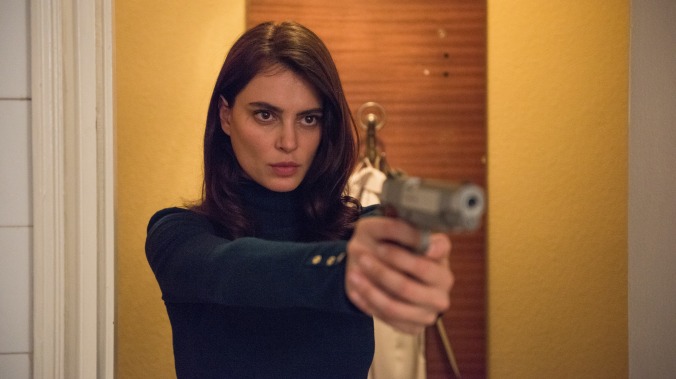The Whistlers is a delectable deadpan noir


In the opening scene of Corneliu Porumboiu’s The Whistlers, a middle-aged Romanian cop arrives in the Canary Islands to the mocking strains of Iggy Pop’s “The Passenger.” It’s not official police business that has brought him here. In trying to supplement his meager 1,000 euro monthly salary, the stolid Bucharest detective Cristi (Vlad Ivanov) has gotten himself involved with Zsolt, a businessman who launders drug money through a mattress factory, and with Zsolt’s girlfriend, Gilda, a femme fatale straight off the cover of an old paperback. His equally unethical colleagues are on to him, but the more pressing matter concerns the 30 million euros that Zsolt’s Spanish gangster connections would really like to see returned to them. All of this has somehow brought Cristi to the Canaries to learn and master Silbo Gomero, a whistled code invented centuries ago by the inhabitants of the mountainous island of La Gomera.
The byzantine plot convolutions of The Whistlers are doled out in chapters and extended flashbacks with a pervasive movie-movie self-awareness that might recall any number of imitation Tarantinos that have come along in the decades-long wake of Pulp Fiction. Which comes as a big surprise to anyone who has followed Porumboiu’s career. Since his canonical Romanian New Wave comedy 12:08 East Of Bucharest, the writer-director has operated in a mode of minimalist, deglamorized deadpan. The typical Porumboiu character is a schmo whose motivations come down to unrealistic goals, culturally internalized tedium, and a fixation on rules, semantic arguments, and the finer points of fine print. The climax of his follow-up to 12:08 East Of Bucharest, the deconstructed police procedural Police, Adjective, consists of the characters consulting a dictionary.
His latest is meant as a sequel of sorts to that earlier film, though the idea of Porumboiu helming a neo-noir sounds like a joke in and of itself; even to viewers who are unfamiliar with his filmography, it might be hard to get a read on the movie’s level of ironic detachment. Stranger still is the fact that The Whistlers is consistently compelling, helped along by its terse stylistic efficiencies. Far removed from the drab banalities that are Porumboiu’s usual m.o., it offers up double crosses, deadly goons with comb-overs and Lemmy mustaches, and a number of strange delights, including an accomplished action climax, a sex scene that pushes surveillance into the realm of kink, and a starring role for Ivanov, an imposing, balding character actor mostly known for playing scumbags and authority figures in art films. (His more prominent roles include the abortionist Mr. Bebe in Cristian Mungiu’s 4 Months, 3 Weeks, And 2 Days and the villain Brill in László Nemes’ Sunset.)
Somewhere in there is Silbo Gomero, which reduces spoken consonant and vowels to a small handful of whistled phonemes that sound like birdsong. It’s a quirky conceit that fits Porumboiu’s career-long preoccupation with language and quixotic pursuits and his penchant for inspired audiovisual gags. There’s no shortage of those in The Whistlers, from well-timed gunshots to downtempo electronic music that plays on a loop for a police surveillance car. But though the film is often darkly funny, it’s hard to miss the overwhelming surface paranoia evident in the numerous encryptions, façades, bugged rooms, and hidden cameras that factor into its plot. Everything in The Whistlers seems to involve codes, though honor among thieves and duties to the law are not among them.
Combined with Porumboiu’s preference for stone-faced performances (even across multiple languages), the result can be interpreted as subtly absurdist satire, depicting a post-Ceaușescu, post-Securitate world that has simply evolved new forms of mutual suspicion and doublespeak. To that, The Whistlers also adds those male insecurities that are often found in stories of hard luck and dirty money, represented by Cristi’s relationships to a trio of women: the smoky Gilda (Catrinel Marlon); his cold-blooded boss, Magda (Rodica Lazar); and his widowed, meddling mother (Julieta Szonyi). Each of them spells a different kind of trouble for Cristi’s schemes, which are revealed backwards as having escalated from a simple payoff, with every complication adding another bizarre element to the plot.
In regard to Cristi’s attraction to Gilda, it’s worth noting The Whistlers never works as a hardboiled romance—a fact that robs its curious kitsch epilogue of any transcendent potential. Whether it’s really meant to work might be a matter of debate. Even its film references are self-effacing: The Searchers, Psycho, the communist cop thrillers of Sergiu Nicolaescu, and the abandoned Western set that provides the backdrop for the big shootout at the end. Playing with genre cryptograms of gangster villas, opera-loving killers, and glamorously lit cigarette smoke, the film never takes itself too seriously, even if its characters never seem to smile.